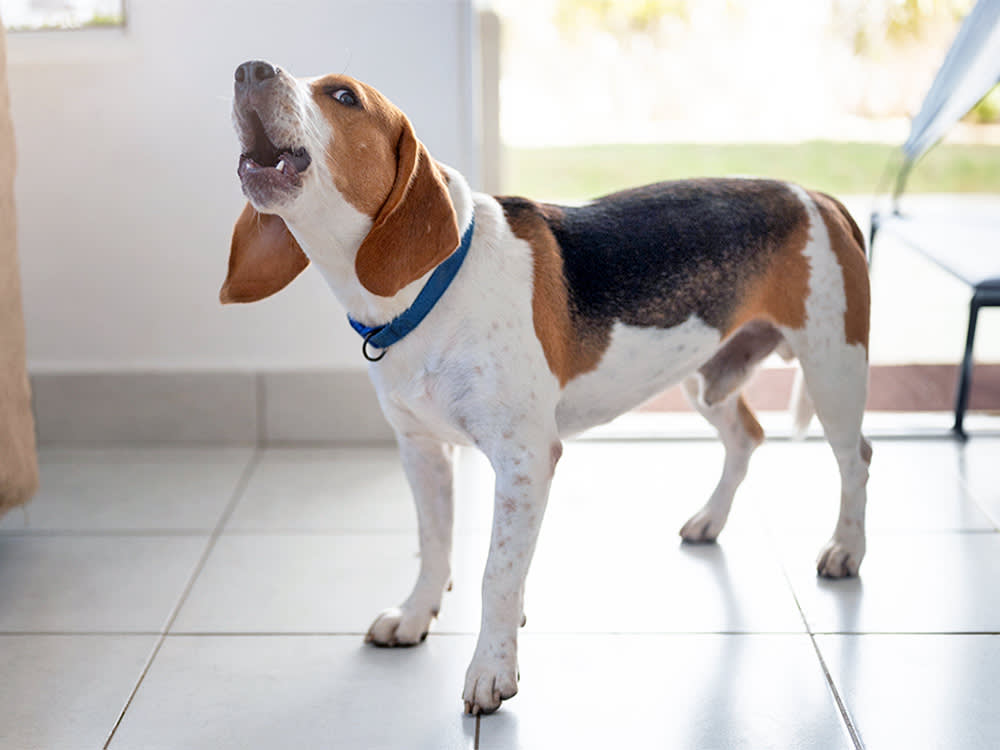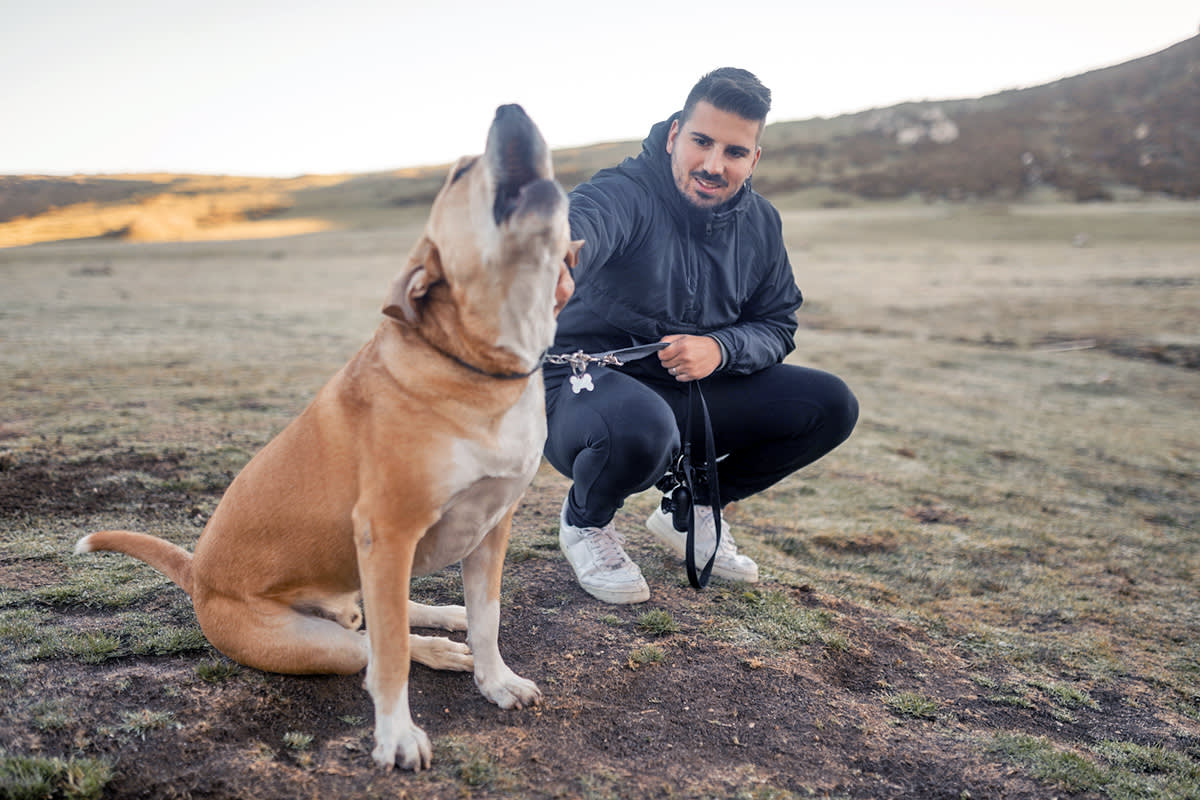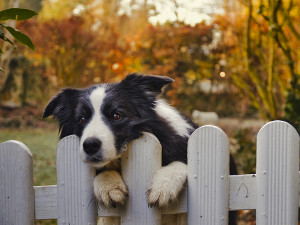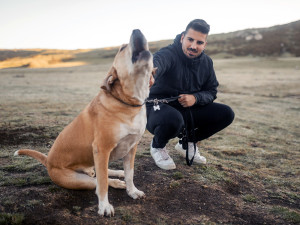Why Is Your Dog Barking the Same Way Over and Over Again?
They are likely trying to tell you something important.

Share Article
More often than not, being a dog parent means trying to decode some seriously strange behavior: Why is my dog staring so intently at that empty corner in the living room? Why are they licking their paws so much? And why can’t they stop humping that one specific friend of mine? Some mysteries are more frustrating than others — and some are loud enough that you’ll want to solve them sooner than later.
For instance, does your dog sometimes bark over and over again in exactly the same way? Same pitch, same intonation, same cadence? To coin a word, this behavior could be called a barkpeat. Get it? Like repeating but, you know, barking.
So, are they barking out the same phrase in dog-speak, like a toddler might monotonously yell, “Mom, mom, mom, mom” when asking for a snack? Does it mean something specific? To get to the bottom of the baying, I asked two experts to share everything they know about canine vocalizations.
Why do dogs bark the same way over and over again?
Actually, they may be repeating the same sound because they are, indeed, asking for a very specific thing; it’s likely they’re trying to communicate something important. The reasons might vary, but if your dog is barking up a symphony, it’s best to pay attention,” says Ann Allums Vest, certified professional dog trainer and owner of Annie The Dog Nannyopens in new tab.

That’s where context clues and body language come in. Assess your dog’s posture, pitch, and surroundings to determine which kind of barking you’re hearing. That way, you can respond accordingly.
“When we do not respond to a dog who is communicating a need or concern, the dog will continue to vocalize,” Vest says. “For example, when the doorbell rings, a dog may continue alert barking until the person goes away or until the dog decides the person at the door is not a threat.”
Some breeds might also make specific vocalizations of their own, says Alexandra Calgut, certified behaviorist and owner of Training That Staysopens in new tab. Beagles and other Hounds, for instance, are bred to bay, letting their parents know where they are — a behavior that can seep into other aspects of daily life. “When we start to distinguish what each kind of sound may mean, we start having a better understanding of what our dogs’ needs are,” she says.
Why do dogs bark in the first place?
Usually, dogs bark because they're excited, alert, bored, or demanding something. Behaviorist Tressa Fesseden-McKenzie wrote for Kinship that “barking is one of the trickiest behaviors to decode. And that’s a problem, because it’s not only irritating; it can also be an indication that something is not quite right with your pal.” (Even if that something is just that they need your attention and love.)
Playtime barking
Barking doesn’t always have to be a bad thing; it’s also how our dogs express joy. Per Vest, dogs sometimes bark at us or other dogs to initiate playtime. If your dog is already at play and letting out a few yaps, they are probably having a blast.
Excited barking
Happy barking isn’t only about playtime. Sometimes, it’s about you. “You may have excitement barking when returning home from work and your dog is super excited,” Vest says.
Alert barking
Dog parents know better than anyone that our precious babies can also make great alarm systems. Weird noise in the apartment hallway? They’re on it. Mailman walking down the street? Have mercy! If anything out of the ordinary is happening, they’ll let us know. Relatedly, if something scares your dog, they might bark at it as a defensive tactic.
Bored barking
Boredom barking can start when a dog is left alone for long periods with no enrichment,” Vest says. If your dog spends eight hours waiting for you to come home from work with no mid-afternoon walk or playtime, you might hear them express that frustration vocally.
Demand barking
If your dog is dying for attention, treats, or a toy, they might let you know by barking. If you deny their pleas, there’s a good chance they’ll howl even more. Training can help wean them off this behavior, but be warned: The barking might get worse before it gets better.
What do different barks mean?
Struggling to figure out what emotion your dog is trying to convey? The pitch of their barks could provide some clues. “Context is key when it comes to understanding what the different bark can mean,” Calgut says. “High-pitch barks can mean the dog is excited over the toy it’s playing with, or it’s frustrated because the toy is stuck under the couch. Deeper barks can mean the dog is uneasy. It could also mean the dog is in a protective mood.”
Vest agrees that high-pitched barking signifies either excitement and friendliness, anxiety, or fear. Lower-pitched sounds, on the other hand, could be a warning. If you’re not sure which emotion your dog is trying to convey, a quick look at their body languageopens in new tab can help.
“I think by listening to a dog’s barking while also observing the dog’s body language and the situation, we can deduce what emotions the dog may be feeling,” Vest says. “I refer to Alexandra Horowitz’s book Inside of a Dog for a scientific overviewopens in new tab of dog vocalizations. She studies pet dogs at her dog cognition lab at Barnard College.”
Once you’ve determined what feeling your dog is trying to express, you can begin looking for ways to help resolve it.
What to do if your dog won’t stop barking
Once you’ve determined why your dog can’t stop barking, you can start coming up with solutions that address their underlying emotions. “If your dog is barking at the door as well as whimpering, that may be a sign he needs to go out,” Calgut says. “If your dog is barking out the window at a squirrel or the mailman, the key is redirection.”
For alert barking, Vest suggests, a simple “thank you” might suffice. “At my house, the dogs will bark a few times when they hear the doorbell, and I have taught them that I say, ‘Thank you’ and reward them with treats, so basically they did their job of alerting me, and they can stop barking now,” Vest says. “Since I addressed the dogs’ concerns and added something good (a treat), the barking doesn’t continue over and over.”
If gratitude doesn’t work, you can also try removing the stimulus for alert barking by closing the curtains or mitigating outside noise.
If your dog is howling with excitement, Vest suggests modeling the behavior you wish to see in your dog. If you want them to calm down, be calm yourself (they can smell your stress, after all). Instead of yelling, “No” or “Stop,” which your dog will construe as you barking with them, sit down and stroke them calmly. Put some treats on the ground to redirect their attention. In other words, create a soothing environment.
On the opposite end of the spectrum, boredom barking comes from a need for stimulation. In those cases, Vest says, “I address the dog’s need for enrichment and attention.” Give them some love, pull out a toy, or find a way to give them some exercise — whatever gets your dog’s gears happily turning again.
Demand barking, on the other hand, requires some serious patience. The best course of action is to ignore the noise, even when your dog inevitably starts barking louder. Offer occasional rewards when the barking stops for a period of time.
As for play barking, Vest says, “I may encourage my dog to pick up a toy, or I may gently interrupt the play session until the barking ceases and then let them resume playing.”
When should I see a trainer or a vet?
If your dog’s behavior begins to escalate, Calgut suggests seeking help. If the barking becomes disruptive to yourself or neighbors, check in with your vet to ensure there are no underlying medical or anxiety issues. Then, you can begin looking into a rewards-based trainer who can come up with an appropriate behavior-modification plan.

Laura Bradley
Laura is a New York-based experienced writer and mom of two rescue pups. Her work has appeared in Slate, Vanity Fair, Daily Beast, The Washington Post, The Atlantic, Yahoo! News, Vulture, Grazia Magazine, and more. When she is not writing or walking the pooches, you will probably find her in the community garden.
Related articles
![Dog barking]()
How to Stop Your Dog From Barking
The top five reasons dogs bark—and how to get them to relax a bit.
![Border Collie dog peering behind white fence]()
Why Does My Dog Bark at the Mail Carrier?
How to get your pup and the mail carrier to be friends.
![Dog Barking In Nature Next To Its Owner.]()
Getting Ads for Anti-Barking Devices? Here’s Why You Shouldn’t Buy One
Two trainers advocate against using these devices—here’s why.
Can Dogs Communicate With Each Other?
It’s about more than barking.
What Do Puppy Sounds Mean?
Besides being ridiculously cute.






